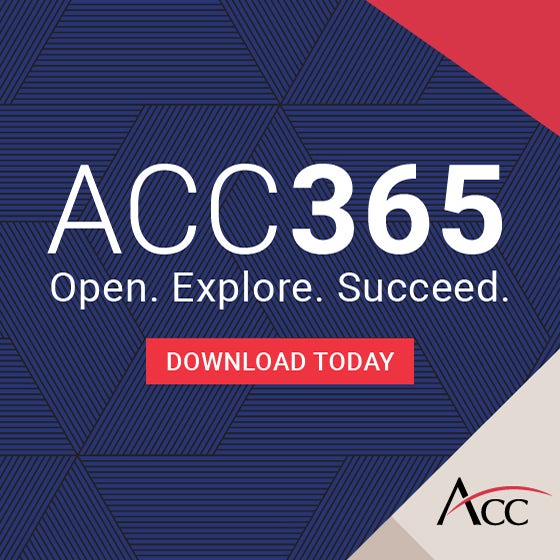1. Use of the title ‘Senior Legal Counsel’ by in house legal counsel in WA.
The Legal Practice Board of Western Australia (LPBWA) wrote to in house practitioners in WA on 31st October 2019 informing them they have 21 days to cease using the title “Senior Legal Counsel” or variants thereof which include the words “senior” and “counsel” (the “affected legal counsel” (ALCs)) The Letter requested that ALCs amend their title by ceasing to use the words “senior” and “counsel” in their position title, on the basis that this is misleading and potentially in contravention of the LP Regs and LPA.
ACC through the Australian Advocacy Committee and WA Committee has coordinated the WA profession’s response and has lodged an interim submission to the LPBWA , which was considered at the LPBWA’s Professional affairs Committee(‘PAC’) meeting. PAC provided ALCs an extension of time to lodge submissions and also provided an undertaking to take no action against ALC’s until all the submissions were considered. ACC lodged a further submission on 15th January 2020, which will be presented to the PAC meeting on 13th February, 2020.
2. The Glencore Case and Legal Professional Privilege
In 2019 ACC requested to file an amicus curiae brief in Glencore International AG vs Commissioner of Taxation of the Commonwealth of Australia, a case before the High Court of Australia regarding documents obtained in the 2017 Paradise Papers leak.
ACC sought leave to appear as an amicus curiae to support plaintiff Glencore International’s claims of privilege, as well as to address the broader international implications of the Court’s eventual decision.
Glencore International has asked the High Court to compel the Australian Commissioner to return documents that Glencore asserts were obtained illegally and should have been protected by legal professional privilege.
The High Court has now confirmed its stance that legal professional privilege operates only defensively, as a means of resisting compulsory production, and does not confer a positive right to restrain the use of privileged material disclosed without authorisation.
ACC is concerned about the ramifications of the decision for in house lawyers, who wish to protect the interests of their client, being their employer. There are at least three ramifications for in house lawyers
- Firstly, ACC believes allowing the government or any other third party to retain and use privileged documents in this manner could undermine client candour.
- Secondly, the decision could further incentivise cybercriminals to attack law firms and hold sensitive client information ransom, threatening disclosure. Hackers could also publish stolen documents on the internet.
- Thirdly, it may encourage stolen privileged documents to be leaked specifically in the Australian jurisdiction by international cybercriminals, making Australia a targeted repository for stolen material and an international cybercrime and data leak haven.
A number of solutions have been canvassed to protect the interest of parties whose documents have been released into the public domain through no fault of their own.
The High Court itself raised the first solution in the Glencore decision itself and observed that once privileged communications are disclosed, a privilege holder must resort to the equitable doctrine of breach of confidence for protection.
Other observers have raised the second solution being the Tort of Privacy. This law is not well established and currently would not provide the necessary legal protection
ACC has recommended a third solution being that specific legislative protections be introduced. If Australia does become a cybercrime haven then the government will need to be involved.
ACC has presented on this topic in a webinar to over 550 registrants. ACC has also met with the Attorney General’s office in Canberra to advocate for specific legislative protection.
ACC has also been appointed to the ATO Legal Practitioners’ Roundtable, a representative forum that is anticipated will discuss the Glencore decision outcomes and work towards protocols.
3. Definition of ‘related entity’ and ‘corporate legal practitioner’ in the Legal Profession Uniform Law
ACC participated in consultation with the Legal Services Council (LSC) and then lodged a submission with the LSC seeking an amendment to the Legal Profession Uniform Law (“the Uniform Law”). The proposed ACC solution is to allow corporate legal practitioners to provide legal services to controlled entities within the same corporate group without breaching any of the provisions of the Uniform Law. The amendment proposed would legitimise the broader scope of work that in-house counsel are able to provide to their employer and other entities within a contemporary corporate structure. The changes would recognise the modern corporate practice of in-house counsel and the wide array of corporate structures in today’s business world that rely on the provision of legal services by their in-house counsel. An amendment of the type proposed would also mean that in-house counsel would no longer be forced to take out a Principal Practising Certificate with the concomitant requirement to also take out professional indemnity insurance. Currently that is the only viable work-around which enables in-house counsel to fulfil their employer’s legitimate needs for legal services within their particular corporate structure.
If ACC’s proposal is accepted by the LSC it is hoped that the legislators will be able to facilitate the passing of the legislation for implementation later in 2020.
4. ASIC Consultation Paper (CP) 321 Whistleblowing Policies
Following the direction and input from the ACC Australia Advocacy Committee, ACC Australia provided a written submission to ASIC in response to its proposed guidance for entities that must have a whistleblower policy. ACC Australia (ACC) acknowledged the importance of having internal policies and procedures in place to support and protect staff who make or may make disclosures about wrongdoing. While ACC Australia is broadly supportive of the proposed guidelines for entities that must have a whistleblower policy – public companies, large proprietary companies and proprietary companies that are trustees of registrable superannuation entities, ACC offered three points of feedback and comment on Consultation paper 321 and Draft Guidance:
ACC Australia was pleased that ASIC good practice guidance expressed a preference for internal reporting.
ACC Australia believed the ASIC good practice guidance on roles and responsibilities under a whistleblower policy was overly prescriptive and further believed ASIC should revise this section to be more principles-based.
ACC Australia requested further guidance on protections that might be afforded to in-house legal counsel (IHLC) when the IHLC themselves are put into a position where they feel it necessary to become whistleblowers.
On 13th November ASIC released regulatory guide 270 on Whistleblowing in response to the recent submissions. Whilst some of ACC’s requests were met regarding simplification and prescription, ACC is concerned about lack of clarity of protection of corporate counsel as whistleblowers particularly with respect to LPP.
5. Australian Law Reform Commission (ALRC) - Corporate Criminal Liability
The Australian Law Reform Commission has been asked by the Federal Attorney-General to undertake a comprehensive review of some of the fundamental principles of Australian corporate criminal liability including:
- the ways in which companies can be held liable for the conduct of their employees and agents (corporate criminal attribution);
- the ways in which senior officers of companies can be held criminally liable for corporate misconduct; and
- criminal law procedures as they apply in corporate criminal investigation and prosecutions.
The inquiry is expressly instructed to have regard to the findings of the Banking Royal Commission and the ASIC Enforcement Review Taskforce. The ALRC is also required to consult with law enforcement, courts, and other stakeholders with expertise and experience in corporate law and white collar crime. It is required to provide its report by 30 April 2020.In this environment, it will be important that Australia’s legal framework has in place appropriate safeguards to prevent honest senior officers such as GCs, who have appropriately discharged their duty of care and diligence, from being held liable for corporate crime.
ACC is working with the ACC Australia Advocacy Committee on this issue.
6. Scope of corporate practice - related entity - WA
WA has announced it will introduce the Uniform Law commencing 1 July 2020, which is a delay of one year from the original announcement.
The Attorney-General in WA has written to ACC requesting a submission regarding transitional provisions to facilitate the planned changes to the Uniform Law in WA.
ACC is working with the WA committee to prepare the submission.

